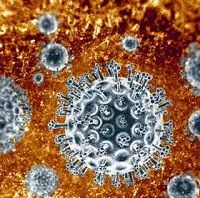Hepatitis C Damage Doesn't Stop at the Liver, Renal Failure Risk Seen
When patients with chronic kidney disease also have untreated hepatitis C, the prognosis is grim. The combination can lead to end-stage renal disease, a study found.

A new study of chronic kidney disease (CKD) patients shows untreated hepatitis C virus infection (HCV) leads to a more precipitous decrease in kidney function, a decline more likely to become end-stage renal disease (ERD)
Reporting at IDWeek 2016 in New Orleans, LA, Sara Tartof, PhD, MPH, of the Kaiser Permanente Southern California (KPSC) Research & Evaluation Department in Pasadena, CA, and colleagues found CKD patients with untreated HCV were one and a half times more likely to suffer 25% decrease in the estimated glomerular filtration rate (eGFR) and 2.5 times more likely to develop ERD.
The Impact of Untreated Hepatitis C Infection on Progression of Renal Decline among Patients with Chronic Kidney Disease, compares data on 150,712 CKD patients and 1,706 with both HCV CKD. Patient data included men and women aged 18 and older diagnosed from 2004-2014 at Kaiser Permanente in southern California and Mid-Atlantic states.
CKD was identified by two occasions of eGFR < 60 mL/min/1.73m2 that are >90 days apart, with eGFR never returning ≥60.
Chronic HCV infection was identified by at least one of these: positive HCV RNA, HCV genotype, two or more refills of anti-HCV drugs within one year,
and positive HCV antibody test plus ≥1 HCV-coded visit.
Baseline was defined as the year prior to index date (date of CKD or HCV diagnosis, the latter for the CKD+HCV cohort).
Researchers compared the rate of change in the estimated glomerular filtration rate (eGFR), time to a 25% decrease in eGFR, and time to ESRD between HCV treatment-naive patients with CKD compared to those with CKD alone.
In the adjusted GEE model, eGFR declined by 1.24 (95% CI: -1.88 to -0.61) points more per year in those with HCV and CKD compared with those with CKD alone.
Risk of a 25% decline in eGFR was 1.54 (95% CI: 1.42 to 1.67) times higher. ESRD risks were 2.53 (95% CI: 2.13 to 3.01) times higher in those with HCV+CKD, compared to those with CKD alone.
The team identified the “substantial independent effect “ of HCV on renal decline among CKD sufferers, a finding that they hope may be mitigated with the advent of newer direct acting HCV antivirals.
Related Coverage: